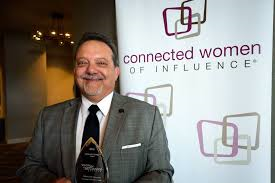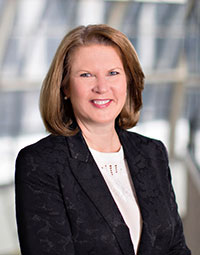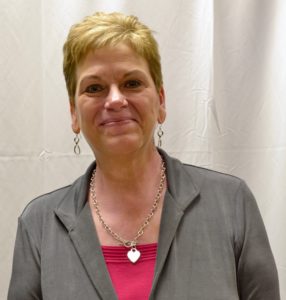Rip Rippetoe Honored With Catalyst For Change Award At Women Of Influence Event
Clifford “Rip” Rippetoe, president and chief executive officer of the San Diego Convention Center, was recently honored as the inaugural winner of the “Catalyst for Change” at the Women of Influence Awards. This first-of-its-kind award “recognizes a man who has shown by deed, actions and accomplishments the advancement of other businesswomen and has a track record of success and accomplishments by mentoring and/or supporting women in their profession, industry or enterprise.”
Rip’s executive team at the San Diego Convention Center is led by a diverse group of professionals, the majority of whom are women including Executive  Vice President & General Manager Karen Totaro, Senior Vice President & Chief Financial Officer Mardeen Mattix, Executive Director of Communications Barbara Moreno, and Executive Director of Human Resources Terry Kurtenbach.
Vice President & General Manager Karen Totaro, Senior Vice President & Chief Financial Officer Mardeen Mattix, Executive Director of Communications Barbara Moreno, and Executive Director of Human Resources Terry Kurtenbach.
IAVM congratulates Rip for his work at the venue, in the community, and in serving as a true catalyst for change!
VenueConnect Stadiums Track Keynoter Frank Supovitz Knows What To Do When Things Go Wrong
As someone who has worked the biggest, boldest, and brightest events to light up a marquee for more than 25 years, Frank Supovitz is more than familiar with the subject of what to do when things go wrong. Supovitz, founder of Fast Traffic Events & Entertainment in 2014, an event management and consulting company based in New York, will keynote that exact topic during the Stadiums track session at VenueConnect this July in Toronto.
Supovitz is an award-winning event producer who client list over the years includes the Indianapolis Motor Speedway, New York City’s South Street Seaport, the BIG EAST Conference, Greater Fort Lauderdale Convention & Visitors Bureau, Australia’s National Rugby League, and the Pro Football Hall of Fame. Supovitz also served as senior vice president, events, for the National Football League, overseeing the meteoric growth of the Super Bowl, Pro Bow, and the NFL Draft.
“We work in an industry where the law of averages simply work against us,” Supovitz said during a break before traveling to speak before another  conference. “We bring hundreds of thousands of people through our buildings each year for anywhere from a dozen to multiple dozens of events. We have a diverse number of experiences and environments, from the seating bowl to clubs, restaurants, hospitality venues, back-of-house, and fan plazas.
conference. “We bring hundreds of thousands of people through our buildings each year for anywhere from a dozen to multiple dozens of events. We have a diverse number of experiences and environments, from the seating bowl to clubs, restaurants, hospitality venues, back-of-house, and fan plazas.
“We operate facilities with systems for security, ticket sales, dining and drinking, guest services, presentation technologies, connectivity, and points-of-sale. There are processes, procedures, load-ins, load-outs, and routine events operations. With that many details, something large or insignificant is going to go wrong every single event, maybe every single day. What’s funny is that I speak almost as much to organizations that are not in our industry as those who are, because every organization in every kind of business if faced with the challenge of making things NOT go wrong or dealing with them when they do anyway.”
Prior to joining the NFL, Supovitz led the National Hockey League’s Events & Entertainment department from 1992 to 2005, managing and producing the NHL All-Star Weekend, the Stanley Cup Finals, the NHL Awards Television Special, and international competitions across the globe in Canada, Europe, and Japan. So, yes, things can and do go wrong not just in the good old USA, but at all points of the world.
With that backdrop and expertise, Supovitz is sure to have plenty of takeaways for attendees in Toronto in a session where the format will differ as Supovitz is interviewed and asked questions rather than the standard keynote address.
“I generally talk less about how to plan to avoid a crisis or disaster to people like us because we plan for a living,” he said. “I concentrate more on what to do in real-time when trouble happens, and as much on what not-to-do, and when time is not on your side. Because I’ve managed or produced mega-events in a stadium, arena, or public setting for almost 30 years, lots of things have gone wrong under my watch. Some have been minor, some have been miserable, and some have been very public, but in looking at all those experiences and how they were handled, or could have been avoided, I’ve noticed a number of patterns and consistent truths. I call them Mega-Truths, and I’ll share a list of 10 of them that have helped to guide me though some tough spots, like the blackout at Super Bowl XLVII in New Orleans, or when the Stanley Cup proved that gravity is still a law on its 100th birthday. It’s fun to laugh about those things now. But, they were serious business at the time.”
Supovitz is the first to admit he has led a charmed life in getting to do things he often dreamed about.
Managing events like the Super Bowl and NFL Draft for the National Football League my dream job for nearly a decade, and 13 seasons at the NHL before that provided a great launching pad for that experience,” Supovitz said. “I left the NFL in 2014 to start my own event management, production and consulting business and have since been able to contribute to, and learn about sports, events, and venues that are new to me like the Indy 500, the National Rugby League in Australia, the BIG EAST Men’s Basketball Tournament, even beach volleyball and extreme calisthenics. But, it all started as a 15-year old usher at Radio City Music Hall, where I worked my way through the organization to usher captain, upholsterer’s helper, mail room clerk, marketing manager, and eventually, the director of special events.
“I learned something really important about training and customer service on my very first day at Radio City, something that I remind myself of all the time, and worth sharing with you: the people that you most rely on to provide the best service experience to your fans and guests are often the ones that are the least paid, the least appreciated. The secret sauce is getting them invested in your venue’s success. Take that from a guy who’s walked miles of aisles.”
Wisconsin Center District Names Doug Johnson New Vice President Of Entertainment And Sports
The Wisconsin Center District (WCD) has named Doug Johnson as Vice President of Entertainment and Sports, effective April 16, 2018. The WCD owns and operates the Miller High Life Theatre, UW-Milwaukee Panther Arena, and Wisconsin Center.
Johnson’s hire comes just weeks after the WCD announced the start of new President and CEO, Marty Brooks. Brooks has been tasked by the WCD Board to increase both utilization and profitability of all properties, especially the Miller High Life Theatre.
“A building as beautiful and versatile as the Miller High Life Theatre cannot go underutilized,” Brooks said. “It seemed to me that we needed the right person with the right relationships to book the space. I created this new position and we were lucky to find that person just down the road. The future of entertainment for the WCD is very exciting.”
With more than 25 years of consistent and progressive entertainment management, agent, and promoter relationships, Johnson will influence the future of entertainment and non-traditional sports programming across WCD properties.
“The WCD facilities and administrative staff are in a great position to take entertainment to the next level for the people of Wisconsin,” Johnson  said. “I am really excited to bring local, regional, and national promoters into the superb properties of the Wisconsin Center District.”
said. “I am really excited to bring local, regional, and national promoters into the superb properties of the Wisconsin Center District.”
Most recently Johnson has been the Senior Director of Arena Entertainment for the BMO Harris Bradley Center. While there, Johnson positively influenced the routing of significant shows and productions, bringing them into the Milwaukee market.
“The way to increase utilization is to increase meaningful relationships,” he said.
Prior to his tenure at the BMO Harris Bradley Center, Johnson spent nearly two decades as Senior Entertainment Director for Milwaukee World Festival, Inc., better known as Summerfest. While there he influenced all facets of the global festival, including operations, marketing and communications, logistics, hospitality, security, and production.
Brenda Bazan Named New President/CEO Of Houston First Corporation
The Houston City Council unanimously approved the appointment of Brenda Bazan as the new president and CEO of the Houston First Corporation (HFC). Bazan assumed immediate responsibilities in her no position.
Bazan is no stranger to Houston First, having been with the organization since its inception in 2011, serving as the chief financial officer where she  oversaw finance, human resources and purchasing functions of the organization. Her career with the city of Houston began in 1993 where she held several positions in the Controller’s Office including director of finance and accounting and also with the Convention & Entertainment Facilities department where she served as deputy director. She has also worked on citywide endeavors such as property insurance, energy procurement and management and debt-related issues.
oversaw finance, human resources and purchasing functions of the organization. Her career with the city of Houston began in 1993 where she held several positions in the Controller’s Office including director of finance and accounting and also with the Convention & Entertainment Facilities department where she served as deputy director. She has also worked on citywide endeavors such as property insurance, energy procurement and management and debt-related issues.
“It’s an honor to be selected by Mayor Turner and confirmed by Houston City Council,” Bazan said. “The Houston First model is the first of its kind in the destination marketing industry and has achieved record successes across the organization, including sales, tourism, marketing and public relations. I’m fortunate to have such an awesome team of professionals at Houston First, and together I know we will continue transforming our big dreams into big successes for our beloved city. The future of Houston is bright and I am committed to making sure HFC serves as a beacon of light.”
IAVM Welcomes Lori Harvey
The International Association of Venue Managers has named Lori Harvey as the new Business Development Manager. Bringing more than 15 years of experience in the advertising and trade show industries, Harvey will be working within the Sales Department, with her primary focus on advertising and sponsorship sales.
“Lori brings over 15 years of experience in successfully creating and selling advertising programs while developing customer relationships,” said Christy Jacobs, IAVM Director of Marketplace Sales. “Her background in delivering ROI and enhancing customer experiences will be a true asset to our team and our membership.”
 “IAVM has an exciting suite of advertising offerings with an extraordinarily targeted audience,” stated Harvey. “I look forward to working with our members offering them the best most effective options available. My goal in this new position is to work with our members on a consultative basis, to help them understand all of the advertising options we offer, and find the most effective solution for their product or service.”
“IAVM has an exciting suite of advertising offerings with an extraordinarily targeted audience,” stated Harvey. “I look forward to working with our members offering them the best most effective options available. My goal in this new position is to work with our members on a consultative basis, to help them understand all of the advertising options we offer, and find the most effective solution for their product or service.”
Harvey comes to IAVM after spending the past 15 years working with the Dallas Market Center selling advertising for all of their publications and on-site opportunities and working to launch multiple new print and digital publications.
“One thing I would want our members to know about me is my passion is helping my clients,” added Harvey. “I will work hard to make sure we are offering AND delivering the very best products for our members.”
Do you want to receive a Front Row News weekly digest?
Categories
- Allied (861)
- Architecture (147)
- Arenas (747)
- Career (897)
- Convention Centers (895)
- Education (623)
- Events (1,544)
- Food & Beverage (193)
- Foundation (113)
- Guest Experience (1,496)
- Industry News (2,270)
- Leadership (1,888)
- Marketing (150)
- Membership (2,000)
- Music (213)
- Performing Arts Centers (454)
- Professional Development (409)
- Research (127)
- Safety & Security (442)
- Sports (763)
- Stadiums (608)
- Student (159)
- Technology (516)
- Ticketing (92)
- Touring (82)
- Trends (364)
- Uncategorized (753)
- Universities (218)
- Video (25)
- Young Professional (198)
Twitter Feed
- Twitter feed loading
Recent Posts
- College Park Center and Texas Hall Welcome Kristina Hill to Executive Director Role
- Cincinnati Convention Center Appoints Brian Clark as Assistant General Manager
- Capital One Arena Hosts Record-Setting PWHL Game, Highest-Attended In-Arena Game in U.S. Women’s Hockey History
- VenuWorks Appoints Local Arts Advocate Matt Hammond as Executive Director of Paramount Arts Center
- Dale Adams, CVE, Named Executive Director of Arizona State Fair
Categories
- Allied
- Architecture
- Arenas
- Career
- Convention Centers
- Education
- Events
- Food & Beverage
- Foundation
- Guest Experience
- Industry News
- Leadership
- Marketing
- Membership
- Music
- Performing Arts Centers
- Professional Development
- Research
- Safety & Security
- Sports
- Stadiums
- Student
- Technology
- Ticketing
- Touring
- Trends
- Uncategorized
- Universities
- Video
- Young Professional
Archives
- January 2026
- December 2025
- November 2025
- October 2025
- September 2025
- August 2025
- July 2025
- June 2025
- May 2025
- April 2025
- March 2025
- February 2025
- January 2025
- December 2024
- November 2024
- October 2024
- September 2024
- August 2024
- July 2024
- June 2024
- May 2024
- April 2024
- March 2024
- February 2024
- January 2024
- December 2023
- November 2023
- October 2023
- September 2023
- August 2023
- July 2023
- June 2023
- May 2023
- April 2023
- March 2023
- February 2023
- January 2023
- December 2022
- November 2022
- October 2022
- September 2022
- August 2022
- July 2022
- June 2022
- May 2022
- April 2022
- March 2022
- February 2022
- January 2022
- December 2021
- November 2021
- October 2021
- September 2021
- August 2021
- July 2021
- June 2021
- May 2021
- April 2021
- March 2021
- February 2021
- January 2021
- December 2020
- November 2020
- October 2020
- September 2020
- August 2020
- July 2020
- June 2020
- May 2020
- April 2020
- March 2020
- February 2020
- January 2020
- December 2019
- November 2019
- October 2019
- September 2019
- August 2019
- July 2019
- June 2019
- May 2019
- April 2019
- March 2019
- February 2019
- January 2019
- December 2018
- November 2018
- October 2018
- September 2018
- August 2018
- July 2018
- June 2018
- May 2018
- April 2018
- March 2018
- February 2018
- January 2018
- December 2017
- November 2017
- October 2017
- September 2017
- August 2017
- July 2017
- June 2017
- May 2017
- April 2017
- March 2017
- February 2017
- January 2017
- December 2016
- November 2016
- October 2016
- September 2016
- August 2016
- July 2016
- June 2016
- May 2016
- April 2016
- March 2016
- February 2016
- January 2016
- December 2015
- November 2015
- October 2015
- September 2015
- August 2015
- July 2015
- June 2015
- May 2015
- April 2015
- March 2015
- February 2015
- January 2015
- December 2014
- November 2014
- October 2014
- September 2014
- August 2014
- July 2014
- June 2014
- May 2014
- April 2014
- March 2014
- February 2014
- January 2014
- December 2013
- November 2013
- October 2013
- September 2013
- August 2013
- July 2013
- June 2013
- May 2013
- April 2013
- March 2013
- February 2013
- January 2013
- May 2012
- March 2012
- December 2011
- November 2011
- October 2011
Recent Comments
- Frank Bradshaw, Ph.D., CVE on John Meyer, CVE, a Tireless Advocate of Certification for Venue Professionals, Has Died
- Neil Sulkes on Hilary Hartung, Friend to Many in Venue Marketing, Has Left Us
- Jason Parker, CVE on The Devastation of Hurricane Helene and How We Can Support One Another
- Larry Perkins on Touhey Testifies Against Speculative Ticketing Before Congressional Subcommittee
- Peter Secord on Major Players for Planned Elkhart Amphitheater Were in the Mix at VenueConnect
